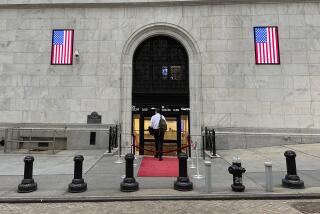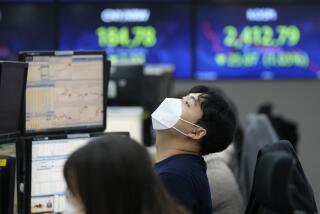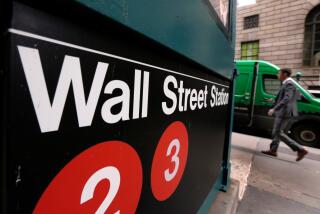China stocks sink amid ‘bubble’ fear
- Share via
SHANGHAI — Zhang Mei sat inside a packed, smoke-filled stock trading hall here today, still pained by a plunge in share prices the day before that cost her almost a tenth of her retirement funds.
“I don’t understand why it dropped so much,” said the retired department store employee, recounting how she raced to the computers here Tuesday in a fruitless bid to sell before the market closed. “It was already too late. There were too many people waiting for computers.”
Shanghai’s benchmark index tumbled 8.8% on Tuesday, its largest drop in a decade, in part because of rumors that Beijing would curtail bank lending for stock investments and impose a tax on capital gains. China’s main stock index opened lower today but recovered quickly and moved into positive territory.
The combined value of China’s Shanghai and Shenzhen stock markets has jumped from $400 billion at the end of 2005 to about $1.4 trillion after Tuesday’s dive, with much of that gain coming in the last six months.
Some analysts say senior Chinese officials have concluded that China’s stock market is in a bubble and that they need to let some of the air out -- just as Beijing has tried with the property market, only to learn that it isn’t easy to do. Chinese regulators have been alarmed about people mortgaging their homes and borrowing funds from banks and pawnshops to speculate on the stock market.
Zhang and millions of other Chinese have jumped into the stock market in the last two years, plowing their bank savings, which earn little interest, into highflying shares. The Chinese are prodigious savers, and with a record trade surplus with the U.S. and other countries, banks have a lot of cash to lend. But Beijing fears a collapse of an overheated market could endanger social and political stability.
Although less than 2% of China’s population has a direct stake in the stock market -- compared with 60% in the U.S. -- nearly 8% of Chinese in cities hold active individual stock accounts, said Lian Weipei, a stock analyst in Shenzhen.
This morning, Chinese officials tried to quash one rumor, saying the government wasn’t planning to introduce a capital-gains tax. That provided a boost to a 72-year-old investor named Chen, who stood like a soldier gazing at the electronic stock board at the Shenyin & Wanguo Securities Co. trading hall here. “I’ve been investing over 10 years. I’m used to it,” he said.
In the last decade, China’s stock market has seen much steeper and sustained drops. And given the fact that several large-capitalization stocks dominate China’s benchmark index, it takes only a little profit taking to pull down the index.
“Beijing would likely like to see the market stabilize ... and then resume a gradual rise path,” said Stephen Green, a senior economist at Standard Chartered Bank in Shanghai. “Of course, the challenge is that they have to combat general bullish sentiment and ample liquidity.”
Even as some investors were brooding at trading halls today, new investors were joining the action.
“It’s normal for it to drop, but the market will come back,” said Wang Zhen, 27, a teacher who came to open a new account. She planned to invest $2,500 into stocks. “I think the market is still good now.”
*
More to Read
Inside the business of entertainment
The Wide Shot brings you news, analysis and insights on everything from streaming wars to production — and what it all means for the future.
You may occasionally receive promotional content from the Los Angeles Times.











